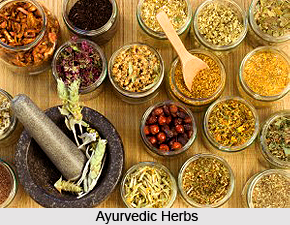 Development of Ayurveda hints back to the practice of medicine and medications by the contemporary sages and saints. Ayurveda has intense mythological association with the creation of cosmos and preservation of life- force. It is said in "Ayurvedavatarana"(the descent of Ayurveda) that Lord Brahma sung these life- giving slokas to other deities who would together relieve human race of severe suffering. Dhanvantari was one among those deities who propagated Ayurveda in the mortal sages; the elixir of life thus came to be known as the divine science of revelation .It equalizes the worth of deep perception, inner vision and realization with empirical observation. Ayurveda is hence, crowned as the "Mother of all healing".
Development of Ayurveda hints back to the practice of medicine and medications by the contemporary sages and saints. Ayurveda has intense mythological association with the creation of cosmos and preservation of life- force. It is said in "Ayurvedavatarana"(the descent of Ayurveda) that Lord Brahma sung these life- giving slokas to other deities who would together relieve human race of severe suffering. Dhanvantari was one among those deities who propagated Ayurveda in the mortal sages; the elixir of life thus came to be known as the divine science of revelation .It equalizes the worth of deep perception, inner vision and realization with empirical observation. Ayurveda is hence, crowned as the "Mother of all healing".
The birth of Indian medicine can be traced back to the days of the famous Indus -Valley civilization of 2700-1500B.C. One notes Sanskrit writings of mythic-religious hymns related to the civilization in Vedas. Atharva Veda and Rig Veda definitely provide us with data of medical practices. The Golden Age of Ayurveda is from 800-1000B.C marked by the evolution of medical texts like Charaka Samhita, Sushruta Samhita, Madhava-nidana, Sarangdhara Samhita,etc.
Ayurveda flourished significantly, during the times of Buddha(520B.C.). The Ayurvedic practitioners of that period invented the unique formula of mixing mercury, sulphur and different metals with beneficial herbs in medicinal compositions. Nagarjuna, the Buddhist herbologist was the greatest exponent of medical science, then. Also big names like Nagbodhi, Yashodhana, Govinda, Vagbhatta worked with him.
The tradition of Ayurvedic medicine, as a chief medical practice, in the rule of Chandragupta Maurya was also present in Emperor`s Ashoka`s paradise of peace. Moreover, the prevention of bloodshed, as a must, inspired the Ayurvedic doctors of that era to innovate new and advanced treatment techniques to avoid surgery. With the Islamic invasion in India (1100-1800A.D.), Ayurveda lost its appeal. However in 1800A.D, a revival was attempted. Ayurveda as a course was introduced in the academics of Sanskrit College, Kolkata in 1827.But unfortunately in 1833 all efforts went in vain. British stopped the educational enterprise.
Western colonisation invited allopathic medicinal method in India which reduced the glory of native Ayurveda.
Nevertheless, Indian National Congress did a lot to retrieve it`s prestige by referring it as a National Healthcare System in 1920. Mahatma Gandhi inaugurated Ayurvedic and Unani Tibia College in Delhi in 1921. In 1927 Madan Mohan Malviya opened an ayurvedic branch in BHU. In 1940 acts were enforced for ayurvedic medicines.
Finally the scenario became better after 1947. Ayurvedic Universities in Jamnagar, Gujrat, BHU and few started conducting research and higher education in Ayurveda. The pharmacopoeia laboratory in Ghaziabad in 1970 was an important establishment. National Institute Of Ayurveda in Jaipur, Rajasthan in 1972-73 is a move ahead. Then the publication of ayurvedic formulary took place. Progress has become the order of the day for Ayurveda. Ayurveda has gained international recognition as well.





